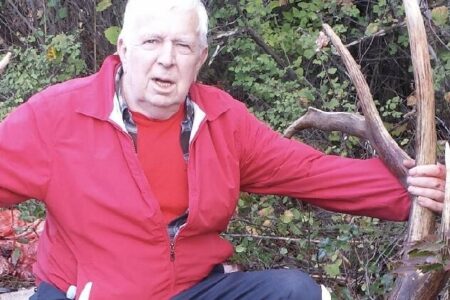Noyes trial continues with RCMP testimony
The trial of Kimberly Noyes, a 43-year-old Grand Forks resident, continues this week as the crown presents its case providing evidence that Noyes is responsible for the murder of 12-year-old John Fulton. Over the last two days the court heard testimony from the Royal Canadian Mounted Police (RCMP) major crimes unit officers who were involved in questioning Noyes after her arrest as well as mental health professionals who were involved in her care in the months prior to the tragedy. When Noyes was taken into custody three officers with the major crimes unit based in Kelowna were responsible for interviewing her in the Grand Forks detachment and in escorting her around the station. On Monday Const. Julie Rockwell described Noyes’ demeanor while she escorted her to interview sessions and to talk with her counsel as co-operative, polite, and quiet. She said that while Noyes’ responded appropriately to questions and comments in context, Noyes did not show emotions. On Tuesday, Crown Counsel Philip Seagram played excerpts from the videos documenting the interviews with Noyes that were conducted in the two days following her arrest, Aug. 18 and 19. Two officers were involved in the interviews, Cpl. Heather Swetnam and Sergeant Owen Wlodarczak. Swetnam confirmed that they gathered background information on Noyes including details of her mental illness and medications that Noyes was prescribed. Swetnam testified that the mental health worker she spoke with advised her that Noyes had received her medication on Aug. 13 and had perhaps only missed a few days if that was the last time she took her pills. The RCMP administered her medication again on Aug. 19 for the first time in what Noyes’ lawyer Deanne Gafar stated was a gap of up to five days. Swetnam said the interview strategy that they had agreed to follow was to develop themes and scenarios that would allow Noyes to rationalize her conduct or take responsibility for her actions. Noyes never did provide any explanation for the events that took place during her interviews. The videos that were played for the court showed Noyes as calm, non-responsive and unable to provide an explanation for her actions. The team leader, Wlodarczak, took over the interviews on Aug. 19 in hope that a change of the interviewer would have an impact in getting Noyes to talk about what had happened. When asked about Noyes’ demeanor and mood, Wlodarczak said that she was very quiet, expressionless, and yet appeared to be listening. “It was difficult to engage in conversation given that she was so quiet,” said Wlodarczak. Wlodarczak gave evidence that he has been involved with interviews of suspects in excess of 30 cases and he compared his interview of Noyes with his past experience. “The biggest thing that stood out to me was her quietness. What I saw was different, simply quietness.” He explained that as an interviewer he sometimes uses silence to make a person uncomfortable but that wasn’t the case with Noyes. Wlodarczak used different techniques, as shown in the video footage, to attempt to appeal to Noyes but she sat quietly throughout the interviews with short, monotone responses to questions. The officers also testified that an undercover operation placing a plain clothed officer in the cell with Noyes did not lead to any information. Gafar questioned both officers on their efforts to seek medical advice regarding Noyes’ bipolar disorder and whether they had tried to identify what might trigger her illness. Wlodarczak confirmed that they had not, although Swetnam said they did talk to the mental health workers about her medication. In an interview, Gafar said that Noyes has been receiving treatment for her mental illness since her arrest and is doing better than she has in years. Gafar explained that in the charge of second degree murder Noyes is facing, the crown is responsible to call forward evidence that is relevant to the charge – intent and the act. “I’ve admitted the act,” said Gafar. “The crown is now calling the evidence that is an issue which is her mental state. They are calling all the evidence that is relevant so this judge can make a proper decision. At the end I don’t expect that there might be a dispute. But the onus is on the defence in asserting the not criminally responsible due to mental disorder defence.” Noyes’ trial will continue until July 22. The trial is being held at the B.C. Supreme Court in Rossland, B.C. and is before Judge Mark McEwan with no jury. Fulton was found dead in Noyes’ home at a townhouse complex in Grand Forks with a knife wound through his neck. Noyes was subsequently arrested and has been in custody since August 2009.

























Comments